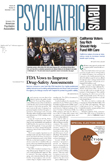Researchers at Harvard Medical School have shown that patients with chronic sleep-onset insomnia see greater improvement from a course of cognitive-behavioral therapy (CBT) than they do from the market-leading hypnotic medication zolpidem (Ambien).
The study, reported in the September 27 Archives of Internal Medicine, was a randomized controlled trial involving 63 adults with chronic sleep-onset insomnia. The research was funded by grants from the National Institutes of Health and National Institute on Drug Abuse.
Patients were randomly assigned to CBT, pharmacotherapy (with zolpidem), a combination of CBT and zolpidem, or placebo. Those in the CBT group received five 30-minute sessions over six weeks. The patients were given daily exercises to teach them to “recognize, challenge, and change stress-inducing thoughts,” according to the study's lead author, Gregg Jacobs, Ph.D., an assistant professor of psychiatry at Harvard and a researcher at the Harvard-affiliated Sleep Disorders Center at Beth Israel Deaconess Medical Center.
Patients were taught techniques such as delaying time of going to bed or getting up to read if they were unable to fall asleep within about 20 minutes of going to bed, Jacobs said in a press release.
Those assigned to receive zolpidem started with 10 mg a night for the first 28 nights (four weeks) of the eight-week treatment period. For the following seven days (week 5), they received 5 mg a night, and then 5 mg every other night for an additional week (week 6). No medication was taken during the final two weeks.
Patients randomly assigned to receive placebo followed the same protocol as the medication group without any CBT or “sham therapy.”
Jacobs was surprised at what he and his team found.
“Sleeping pills are the most frequent treatment for insomnia, yet CBT techniques clearly were more successful in helping the majority of study participants to become normal sleepers. The pills were found to be only moderately effective compared with CBT, and lost their effectiveness soon after they were discontinued.”
All patients kept sleep diaries for 14 days before treatment began, for 14 days at mid-treatment (weeks 3 and 4), and for 14 days after treatment ceased (the end of the protocol). In addition, patients underwent three nights of home-based “nightcap” recordings before and after treatment. The“ nightcap monitor” is a two-channel sleep monitor that measures sleep-onset latency as well as other measures of sleep by using eyelid- and head-movement sensors attached to a small, battery-operated recorder placed under the bed pillow.
The CBT and the combination groups showed the greatest changes in sleep-onset latency at mid-treatment, with both groups showing a 44 percent reduction in the amount of time it took to fall asleep at bed time. Those taking zolpidem showed only a 29 percent reduction, and those on placebo had only a 10 percent reduction in sleep latency. By the end of week 8, the CBT and combined treatment group each yielded a 52 percent reduction in sleep onset. These significant improvements were maintained for the follow-up period of 18 months, whereas improvements seen in the zolpidem group were not maintained over the long term. In fact, Jacob pointed out, “by the end of the eight-week treatment phase, insomnia returned to baseline levels and did not differ from [those of] the placebo group.”
Intriguingly, no significant differences emerged among the groups in terms of total sleep time, though each group exhibited some increase.
“Our results suggest CBT should now be considered the first-line treatment for insomnia, which is experienced on a nightly basis by one-third of the nation's adult population,” Jacobs concluded.
Arch Intern Med 2004 164 1888
